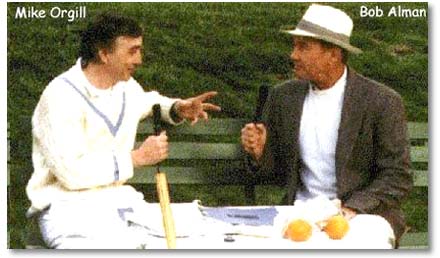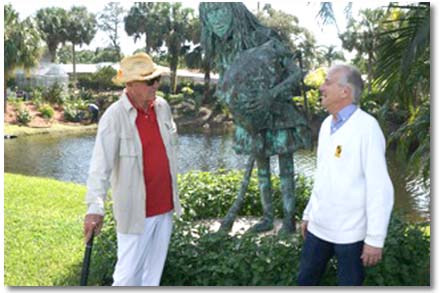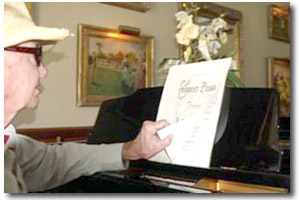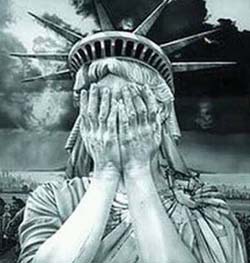

|
Back to |
| The Front Page |
| People |
|
Mike and Bob's second mutual interview |
||||||||
|
photos by Mike Orgill posted November 26, 2016
|
||||||||
|
||||||||
In 1996, the sport in America was only twenty years old, and the big players were mostly in the West; all that has changed, and although the Internet has been a strong influence in the international spread of croquet, it hasn't made a noticeable global difference in the sheer numbers of players who belong to the national organizing bodies. In the middle of this interview, however, a huge and shocking change did occur, mirroring similar seismic shifts overseas: the election of Donald J. Trump to the American presidency.
BOB ALMAN: Mike, I just read our "mutual interview" of 20 years ago and wondered if we should update it. Lots has happened since then--to you, to me, to the sport.
MIKE ORGILL: Okay, I'll send the first question. Re-reading the original interview, I realized that a lot of croquet life had already passed for us. You and I were in the midst of what seemed to be a thriving croquet scene in northern California. I think we took a lot for granted, that it would continue and grow into something. But now, compared with the Bay Area croquet heyday of the 80's and 90's, croquet in San Francisco, Oakland, and Sonoma is a faded image of what it was. It's pretty obvious why it went south. Players moved on, fewer new players began participating, venues changed or fell into disuse.

|
| BEFORE: Mike and Bob in 1996 at the San Francisco Croquet Club, obeying the then current dress code for play on a chilly day. |
BOB: Actually, it went east--to North Carolina. Before Northern California, there was Arizona and, I guess, Florida. Now Mission Hills in California and the National Croquet Center in West Palm Beach are both world-class venues for major international events. So local centers do decline, but others grow. The old players age out of the sport or die, and newer ones come along. But at the time of that interview, you and I had accomplished a lot, don't you think?

|
| AFTER: Bob and Mike in 2016 at the National Croquet Center, with Louis Carroll's Alice looking askance at their attire. Bob is dressed at what he regards the "outer limits" of acceptability for tournament play--white slacks and shoes and a primary-colored polo shirt, plus sun protection. Mike regards his own attire--with the white sweater as a bow to the whites tradition--as okay for ordinary non-tournament club play. |
MIKE: I'm sure that I felt that I had experienced a lot. Looking back, you and I were were solidly in the middle of things when that interview was published. Remembering my attitude then, I must have felt that Bob Alman was the leader, the kingpin of things in the Bay Area. It's hard to believe now, but the northern California croquet scene was quite significant in 1996 and had been for awhile. Damon Bidencope started the croquet program at the Meadowood Resort in St. Helena in the Napa Valley, and it was quite serious. He produced the big $30,000 purse tournament, and he brought Jerry Stark and Peyton Ballenger on board. Jerry Stark produced the Meadowood Croquet Classic. It was still a very prestigious Association rules tournament back then. The Sonoma World Croquet Championship was still going. All the top players from all over the world made their appearances there at that time.
BOB: Yes, and we grew a big share of the American players locally. For a long time, the SFCC was justly called "the club of champions." Our club champions played against the big players from Arizona and Florida, and they usually won--either them or one of the internationals.
MIKE: The San Francisco Open had equaled and in some ways surpassed the Arizona Open as a prestigious American rules event. We had a bunch of great players on the local scene: Taves, Stark, Rodoni, Arnold, Rebuschatis. Bidencope may have moved on, but Neil Spooner was still on the payroll at Sonoma-Cutrer. Ellery McClatchy had established his Ink Grade estate and built a court and was a tremendous force as a patron. Tom and Jane McDonnell were still active after sowing the seeds that grew into the whole Bay Area scene.
BOB: We loved it. And yes, I did consider myself the center of the action, too, pioneering the first two-lawn public club in America. And you said we should do the SF Open, which we did, and that turned out well, too. What made it so much fun, I think, is seeing it all working. But surely you remember that Jack Osborn didn't regard us as "in the center of everything," not at all! Our interview was about ten years after he ended his own brilliant career with the USCA as its founder and builder, by labeling us "Western Killers." And I realize now that it was done in the same year of Jack's death, 1996. I've mentioned this before and maybe told you--I've told others--but early in that year, he called me on the phone and told me he knew he was on the way out and wanted to mend fences. That's the way he said it, "mending fences."
MIKE: I'm glad to hear that he called you. But I don't think that we were actually "at the center of the everything." We were expanding US croquet and Jack should have loved the trend, but somehow he felt threatened by it.
BOB: I was actually impressed that he would do such a thing, such an admirable thing, as to call me. We talked for about half an hour, in the course of which he delivered one of the most expert back-handed compliments I've ever received---and I think I've had more than my share of those. He said, "Bob, I always knew you intended well." I'll never know, I guess, whether he really heard all the dimensions of his own analysis.
MIKE: What do you think about Jack's original vision for croquet? He was an energetic promoter, but I've always thought that his original focus on private clubs and the more affluent segment of society established a unnecessarily low ceiling for the growth of the game.

|
| Mike's current distractions: grandchildren Cora and Amos. He sits with them most weekdays. They are certain to become exceptional adults, under Mike's daily tutelage. |
BOB: But Mike, you and I both heard a good answer to that question when we had dinner in Arizona with one of the many truly exceptional women who supported Jack in organizing and running the USCA--sometimes with their own cash. She told us--didn't she?--that she felt Jack Osborn always had a larger vision for the sport, way beyond the "elite class" with money and influence to get lawns built at their country clubs. That was just a founding strategy, she said. In the eighties--the decade we're taking about--none of the facilities with many courts had been built. So our two-court municipal club in San Francisco could actually harm Jack's "marketing plan"--if that's what it was. And Jack's marketing was tremendously successful at that point. Somehow, everyone knew that the sport of croquet was for "rich people." That's what our own San Francisco board told us when I suggested trying to get the city to built the courts in Stern Grove!
MIKE: I don't remember who this woman was, I'm confused about the "vision". Did Jack want to seed courts at private country clubs and then when sufficient courts were built, go out and convince municipalities to build public courts? A bold, monumental task, but I have a hard time believing that's what he intended. I remember Jack being threatened by the public club in San Francisco, and even more threatened by Brice Jones and his groundbreaking venue at Sonoma-Cutrer.

|
| Bob's current distractions: playing piano at senior facilities and for club functions at the National Croquet Center. (The "Croquet Polka" is a terrible composition, by the way.) |
MIKE: I interviewed Osborn for Croquet Magazine, the second issue. I had a long conversation and sent him a draft of the interview. He didn't like it at all, even though I had tape recorded the phone call with his permission and had not altered what he said aside from editing for length. He called me at work and kept me on the phone, asking me over and over to "spike" the story. I don't remember what his objections were. The thrust of the interview was the then controversy about one-person, one-vote in the USCA, instead of club voting. I don't think he wanted to give the issue any more exposure.
BOB: Well....as a matter of fact, I agreed with him on that issue. Having clubs vote their entire membership one way or the other gave the clubs in America some ACTUAL power, a reason to come together and deliberate serious issues--that's assuming there's any such thing as a "serious" issue in the trivial domain of a fringe sport, of course. I parodied the issue as the "one-woman, one-vote initiative", and I think it actually won because of the simple-minded jingoistic appeal of "one man, one vote." But the truth is, Osborn had persuasive power with the club leadership, so losing that vote just prepared the way for his own exit from USCA management over the "Western Killers" controversy.
FLASH! DONALD TRUMP WINS THE ELECTION
BOB: Good Lord! It's happened. Croquet really does seem incredibly trivial now. I'm really bummed out about this. How can we explain to the rest of the world how the United States of America just became a Third World country? What is going to happen to the Supreme Court? When does construction begin on the GREAT WALL on the Mexican border? Say something, Mike!
MIKE: Yes, croquet seems like a trivial subject right now. I've been processing Trump for hours and I'm at the Anger stage right now. I hope I don't ever get to the Bargaining stage, let alone Acceptance.
| BOB ALMAN'S TRUMP STORY |
|
Although I've never met him personally, I have a Trump story that dates back to 2003, after I had moved to Palm Beach to organize and manage the National Croquet Center. I invited Mar-a-Lago club manager Berdt Lempke to lunch at the Croquet Grill, he reciprocated with a lunch at Mar-a-Lago, and he later offered to give me a tour of the nearby Trump International Golf Club, not yet open. Part of the tour included the dining room and bar, and I commented to Berdt, "That's a gorgeous long bar, but doesn't it kind of block the traffic flow between the bar and the dining room?" He said, "Yes, it does, and that's what I told Mr. Trump." Pause. "So, when are you moving the bar?" I asked. "Bob, I'm going to move the bar when Mr. Trump says to me, 'The traffic flow would be much better if you would re-position my gorgeous bar.' Not long after that, Trump told Berdt, "I think we should have that limited reciprocal with the National Croquet Center. I want to see more people in white on my croquet courts in Mar-a-Lago's front yard."
|
MIKE: I'm hearing all sorts of talk. Anger at Trump voters, the "deplorables", who despite all calls for reason and tolerance, voted for a narcissistic con man (I'm being kind); anger at Hillary and Bill, at their hold on the Democratic party apparatus which deprived the country of more electable candidates, anger at liberals for being so ensconced in their own self-satisfied bubble that they let the election slip due to their contempt for the poor left-behind white male voters. I'm angry at myself for buying into all the triumphalism of the Hillary camp even though weeks before the election I had a gut feeling that Trump would win. I should have taken my life savings and bet on Trump on one of those British gambling sites. I could have had enough to escape -- but to where? I don't think the Earth is room enough.
BOB: I had that same kind of feeling driving through South Georgia in August, visiting croquet-playing friends in the North Carolina mountains. I saw dozens and dozens of Trump signs--on pickup trucks and on the sides of barns, and "Make America Great Again" baseball caps everywhere. Not a sign of Hillary boosters anywhere. It was truly creepy.
MIKE: The liberals are talking about moving to another country!
BOB: Someone told me the Canada immigration site crashed the day after the election. I know people who say they're deciding between Toronto and Vancouver. I don't think they'll really do it. I have a good friend who lives in Aguascalientes, Mexico. He says he has a small house to let. I mean, if you really must escape, you do have options.
MIKE: My son-in-law has EU citizenship. We could move to Ireland. But it might all come to this: the problem is not Trump, his "deplorables", his put-open "forgotten men and women". I think it'd really what Pogo said: "I've met the enemy and it's us." The political system has collapsed after years of malfunction under both Red and Blue.
BOB: And Angela Merkel is now the leader of the free, liberal, democratic world, while Trump has lots of right-wing leaders in Europe now to make common cause with.
MIKE: Maybe Trump will learn something useful from England's example while they untangle themselves from the European Union after Brexit.

|
MIKE: Maybe the "poorly educated white men" think global warning doesn't concern them--because they don't live near the ocean, where the liberals live.
BOB: The bottom line is that people always vote their pocketbooks, it never gets any better for anyone except the already super-rich, which causes perennial frustration when the promises of either party are never fulfilled--can't be fulfilled, and only the "college educated" voters know that, and the marginalized populations are too discouraged to vote for anyone. Here's my best-case scenario, two weeks after the election: The Democrats surge back in the by-election of 2018, somehow save the Supreme Court, and come back strong in 2020 with a good candidate, in a reformed Democratic party that has become genuinely progressive, having learned something from the Sanders experience. It's a long shot--and I'm afraid both "major parties" are unrelentingly and forever corporatists, because corporate money puts them in place and keeps them there. But maybe fundamentalist nationalists won't have completely taken over all three branches by then, and the social agenda of the main-line Democrats can survive.
MIKE: And in the meantime....we can play croquet. We can do croquet therapy, in many forms. Golf Croquet was no big deal in 1996, but right now? I've heard that as many as 600 people at one of the North Carolina clubs play croquet, so there may be a sea change going on, finally.
BOB: But they're mostly playing Golf Croquet. And just a small fraction of them belong to the USCA.
MIKE: And in England, the same thing is going on, while Association Croquet is languishing. Even at Sonoma-Cutrer, most of the play there is Golf Croquet. We still have about 30 members, but when you go out to play on the weekends, there are only half-courts, so not many of the members even play that much, because you have to break down the half-courts and set up a court--which takes some time--and then you have to re-set for the half-courts.
BOB: Sonoma-Cutrer's "thing" in Wine Country, is croquet. It's even on the wine label. So Brice Jones' good idea continues as a big part of the business there, I gather.
MIKE: But--and it may or may not be a "but" depending on your point of view--USCA-rules croquet and Association Croquet are languishing. I liken it to what's happening in golf. The 18-hole game, with the 19th hole at the end, is languishing. People don't have the money or the time. The game is difficult to learn and frustrating. The same goes for both USCA-rules and Association. It takes months to get comfortable with either game and there is little interaction.
BOB: But there doesn't need to be "expansion," Mike, just stability. We made croquet the focus of our entire lives, decades ago. That's what people do with a "social" sport. And in fact, the numbers are stable now, at least in this country, thanks to Golf Croquet. Would country clubs and even public clubs be able to maintain their numbers without Golf Croquet? I think we owe Egypt a great debt for making an easy-to-learn game respectable as the basis of the membership fees that pay the bills for lawn maintenance. So what if most of them are "pat and chat" players?
And Golf Croquet's potential as a social game has yet to be exploited to expand the player demographic to younger, working players, for "networking" or meeting someone dateable at a respectable venue--like the National Croquet Center. That's where the work needs to be done in maintaining or even expanding croquet as an amateur sport.